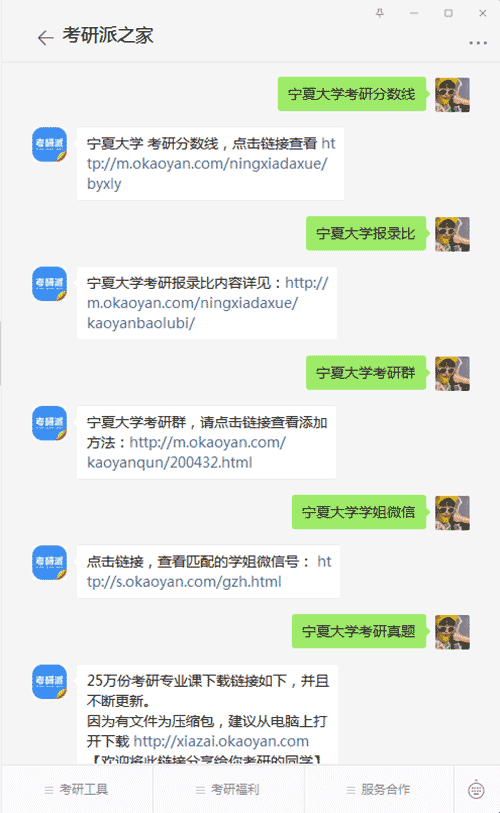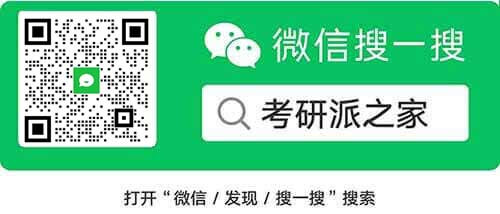
An Analysis of the Major of Ancient Chinese Literature in Ningxia University The content is as follows. For more information about postgraduate entrance examination, please pay attention to the update of our website! Please collect this website, or download our postgraduate entrance exam APP and postgraduate entrance exam WeChat official account (there are many free postgraduate entrance exam resources to receive, and if you have various postgraduate entrance exam questions, you can also directly add our website's postgraduate sister WeChat to answer questions for free throughout the whole process, so as to help you take the postgraduate entrance exam and strive to get into the ideal graduate school as soon as possible.)
+Graduate student of Ningxia University WeChat, answer your questions and send resources 
Analysis of Ancient Chinese Literature Major in Ningxia University
School Introduction Ningxia University is a university jointly built by the Ministry of Education and the People's Government of Ningxia Hui Autonomous Region, a national "first-class discipline" construction university, and a national "211 Project" key construction university. The university now has one national "first-class discipline" construction discipline of "chemical engineering and technology", two "ministerial and district co construction" discipline groups of "chemical engineering and technology discipline group" and "ethnology discipline group", one national key discipline of "grass industry science", and one national key (cultivation) discipline of "Chinese minority history". 18 key disciplines in autonomous regions, 8 advantageous characteristic disciplines in autonomous regions during the 13th Five Year Plan period, 8 key disciplines in autonomous regions during the 13th Five Year Plan period, and 10 "first-class disciplines" construction disciplines in autonomous regions. 6 first level discipline doctor stations, 31 first level discipline master stations, 15 professional master degree authorization stations, 3 post doctoral research mobile stations, and 12 autonomous region academician workstations. Facing the future, the university will focus on the development goals defined in the seventh party congress, base itself on a new starting point, achieve new leaps, comprehensively implement the fundamental task of building morality and cultivating people, seize the new opportunity of "double first-class" construction and "joint construction of departments and districts", adhere to characteristic development, innovative development and high-quality development, and build Ningxia University into a university with distinctive regional characteristics It strives hard to serve the first-class universities in the west with outstanding local capabilities.
Professional Introduction Ancient Chinese literature is a discipline that takes Chinese literature from ancient times to modern times as the research object. The research content includes the evolution and development of various literary styles in various periods of ancient China; Writers, works, writer groups and literary schools; Literary theory and literary criticism.
Examination subjects
| Research direction |
Preliminary examination subjects |
Re examination subject or content |
Reference books or textbooks for preliminary examination |
| 00 Do not distinguish research directions |
① 101 Ideological and Political Theory
② 201 English 1
③ 706 Chinese
④ 811 Chinese Literature |
Re examination content:
History of Ancient Chinese Literature
|
706 Chinese: Modern Chinese (Six Editions) (Volume I and Volume II), Higher Education Press, June 2017 (Sixth Edition), edited by Huang Birong and Liao Xudong; Ancient Chinese (Volume I, Volume II and Volume II), Tianjin Education Press, September 2000 (the first edition), edited by Guo Xiliang.
811 Chinese Literature: History of Chinese Literature (1-4 volumes), Higher Education Press, July 2014 (third edition), edited by Yuan Xingpei; History of Modern Chinese Literature (1915-2016) (Volume I and Volume II), Peking University Press, May 2018 (third edition)
)Edited by Zhu Donglin. |
Bibliography Preliminary reference books: 706 Chinese: Modern Chinese (Six Editions) (Volume I and Volume II), Higher Education Press, June 2017 (Sixth Edition), edited by Huang Birong and Liao Xudong; Ancient Chinese (Volume I, Volume II and Volume II), Tianjin Education Press, September 2000 (the first edition), edited by Guo Xiliang. 811 Chinese Literature: History of Chinese Literature (1-4 volumes), Higher Education Press, July 2014 (third edition), edited by Yuan Xingpei; History of Modern Chinese Literature (1915-2016) (Volume I and Volume II), Peking University Press, May 2018 (the third edition), Zhu Donglin as editor in chief. Re examination bibliography 1. History of Chinese Literature (Volume 1-4), Higher Education Press, the third edition in May 2014, edited by Yuan Xingpei. 2. Selected Literary Works of Chinese Past Dynasties (two volumes each), Shanghai Ancient Books Publishing House, the new edition in June 2002, edited by Zhu Dongrun.
Fractional line
| particular year |
Fractional line |
| two thousand and twenty |
three hundred and forty-five |
| two thousand and nineteen |
three hundred and forty-five |
tuition The tuition fee for full-time Chinese ancient literature in Ningxia University is 8000 yuan per year. Since the autumn of 2014, public funded postgraduates have been canceled and self funded postgraduates have been implemented instead. It is stipulated that the annual tuition fee for postgraduates of master's degree should not exceed 8000 yuan, depending on the specialty of the school. In view of the family difficulties of some graduate students, the state provides scholarships, grants and other subsidies, and colleges and universities generally provide work study positions to subsidize students, so as to ensure that graduate students can complete their studies normally and smoothly.
Main Tutors Liang Zuping, in June 2006, received a doctorate in literature from Beijing Normal University. He is currently a professor and master tutor of the Humanities College of Ningxia University, mainly engaged in the teaching and research of ancient Chinese literature and literary criticism, and his main research direction is literature of the Wei, Jin, Southern and Northern Dynasties, Sui, Tang and Five Dynasties, and ancient literature of Ningxia. Director of the Literary Mind and Carving Dragon Society, member of the Literary Selections Society, and member of the Chinese Ethnic Minorities Society. Lectures include literature of the Wei, Jin, Southern and Northern Dynasties, Sui, Tang and Five Dynasties, ancient writers, and Carving Dragons at the Heart of Literature. Wang Yong, a native of Yongning County, Ningxia, was born in May 1963 of Hui nationality. In July 2008, he received a doctor's degree in Chinese classical literature from Northwest Normal University. He is currently a professor and master tutor of the Humanities College of Ningxia University, mainly engaged in the teaching and research of literature and literary criticism history in the Pre Qin and Han Dynasties. He mainly teaches courses such as "History of Chinese Literature" and "History of Chinese Literary Criticism". Presided over and completed a social science planning project in Ningxia Hui Autonomous Region, and presided over the establishment of a scientific research project in Ningxia universities. He has published one academic monograph and more than 20 academic papers. Li Shulan graduated from the Chinese Department of Beijing Normal University in July 1984 with a bachelor's degree in literature. In July 1993, the postgraduate class of the Chinese Department of Beijing Normal University was completed. He is currently a professor and master's supervisor of the School of Humanities of Ningxia University. He is mainly engaged in the research and teaching of ancient Chinese literature and ancient culture, and he mainly teaches such courses as "Ming and Qing Literature History", "Ming Dynasty Literature Research", "Qing Dynasty Literature Research", and "Song Yuan Literature", "Ming and Qing Literature", etc. He has participated in one research project of the National Social Science Fund, presided over or participated in six autonomous region level scientific research and teaching projects, published more than 10 academic papers, and won more than 10 teaching quality awards, teaching excellence awards, etc. of Ningxia University. Mei Guohong, in October 2009, received a doctor's degree in ancient literature from the School of Literature, Journalism and Communication of Shandong University. He is now an associate professor and master tutor of the Humanities College of Ningxia University. He is mainly engaged in the research of the culture and literature of the Song and Yuan Dynasties, and he mainly teaches courses such as "Literature of the Song and Yuan Dynasties" and "Research on Song Ci". He has published more than 10 academic papers.
Ningxia University
add to Sister of Ningxia University WeChat , or WeChat search public account“ Postgraduate Examination School Station ”, follow[ Postgraduate Examination School Station ]WeChat official account, WeChat signal input at the small station of postgraduate entrance examination[ The postgraduate entrance examination score of Ningxia University, the enrollment ratio of Ningxia University, the postgraduate entrance examination group of Ningxia University, the student sister WeChat of Ningxia University, the real postgraduate entrance examination question of Ningxia University, the specialty catalog of Ningxia University, the ranking of Ningxia University, the research guarantee of Ningxia University, the public account of Ningxia University, and postgraduate enrollment of Ningxia University) ]You can view the corresponding on your phone Information or resources for postgraduate entrance examination of Ningxia University 。

















































